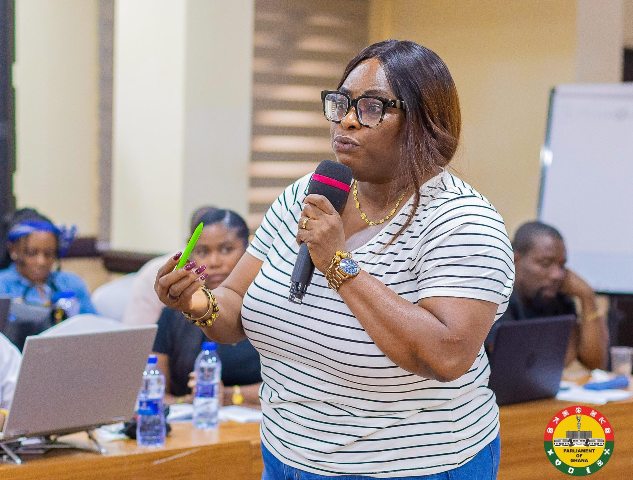Madam Kate Addo, the Coordinating Director in Charge of Broadcasting, Media Relations, and Public Engagements at Parliament, has underscored the vital role of the media in safeguarding Ghana’s democracy, especially in an era where the credibility of journalism is increasingly undermined by social media-based citizen reporting.
She warned that in today’s digital landscape, where anyone with a smartphone assumes the role of a journalist, the nation must recommit to fair, free, responsible, and professional journalism to preserve democratic integrity.
Speaking at a two-day capacity-building workshop for members of the Parliamentary Press Corps (PPC) in Accra, Madam Addo emphasized that the media must not be viewed merely as conveyors of information, but as a fundamental pillar of democracy and a bridge between Parliament and the people.
Also Read: Former Nigerian leader Muhammadu Buhari dies aged 82
She reaffirmed Parliament’s recognition of the PPC’s indispensable role in promoting transparency, accountability, and public engagement, while cautioning against the unchecked rise of unregulated citizen journalism that threatens to erode public trust and journalistic standards.
She lauded the evolution of parliamentary reporting from the colonial era to the present, noting how the Parliamentary Press Corps has distinguished itself through in-depth coverage of national events such as the State of the Nation Address, budget readings, and committee engagements.
“What sets you apart is your ability to go beyond the story, to seek the story behind the story. And we see this excellence every time Parliament is in the spotlight,” she said.
Touching on the objectives of the workshop, Madam Kate Addo noted that the goal is to sharpen the skills of the press corps in understanding parliamentary procedure, legislative interpretation, and ethical reporting while strengthening the bonds between Parliament and the media.
“We aim to equip you to report accurately and impartially on complex issues, while reinforcing your integrity and ethical commitment,” she added. She acknowledged the growing strain in relations between the media and Parliament, and called for a renewed spirit of mutual respect and collaboration.
A strong Parliament and a free, responsible media, she said, are the twin pillars of Ghana’s democracy and urged more collaboration to continue building where information flows freely and every citizen’s voice is heard.
Deputy Clerk to Parliament, Dr. Gloria Sarku Kumawu, in her remarks, challenged members of the Parliamentary Press Corps to move beyond traditional reportage and begin shaping national policy and discourse by leveraging their collective expertise and diverse backgrounds.
She praised the intellectual depth and reach of the corps and called for the establishment of a mentoring and policy-discourse forum within the group.
“I always envy your club,” she confessed. “You are well-positioned to shape discussions and influence policy. You don’t only report — you see what is said and what is not said, and you communicate both exceptionally.”
She urged the Press Corps to formalize its structure to reflect its influence, envisioning a time when members could carry press accreditation cards with pride, backed by a strong reputation as thought leaders in governance reporting.
“You have such rich resources — your intellectual capacity, your diversity, and how far and wide you go. It’s time to institutionalize that strength. Let us see you not only as conveyors of information but also as contributors to nation-building,” she said.
Dr. Kumawu called on the Media Relations Directorate and the leadership of the Press Corps to consider instituting an intellectual forum where members can mentor, exchange ideas, and hold critical discussions on national issues.
The workshop brought members of the Parliamentary Press Corps together to sharpen skills, deepen understanding of legislative processes, and foster stronger collaboration between Parliament and the media.


